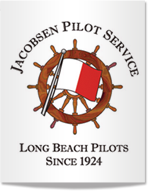About Us
“Every commercial harbor in the nation has its own pilots, and at the Port of Long Beach one family has been running the pilot operation for 90 years,” explains The Los Angeles Times. “It’s the Jacobsen clan, whose roots stretch back to a Norwegian fishing village. Today they are responsible for shepherding ships as long as skyscrapers are tall.”
Jacobsen Pilot Service (JPS) was started three generations ago, in 1924, by Captain Jacob A. Jacobsen, and quickly became recognized as a leader in customer service, technology, and innovation. JPS played a key role in World War II and took over pilotage for U.S. Navy ships—a contract it has held in Seal Beach ever since. Over the Port of Long Beach's 100-year history, JPS has been one of the key figures and has played a prominent role in all of the port's "firsts."
The company's innovation started early on. JPS was the first in the United States to install shore-side radar at the Port of Long Beach in 1949. This cutting-edge technology of the time helped improve safe vessel movements in all weather conditions. Jacob's son, Richard J. Jacobsen, expanded radar technology even further by utilizing fiber optics and microwave for remote radars. This advanced technology allowed JPS to safely pilot in large ships, like the Queen Mary.
In 1962, "containerization" became a game changer for the shipping industry. These stackable mini-warehouses could hold up to 50,000 tons of cargo each. Suddenly, up to 80% of cargo became containerized and ships began to grow to accommodate new loads. JPS evolved with the industry, learning to safely pilot even the largest container ships into the port.
Richard Jacobsen's son, the company's current president, Thomas A. Jacobsen, has continued to honor the company's long-held goal of moving ships safely and efficiently. In 1990, JPS formed a partnership between the Marine Exchange of Southern California and the US Coast Guard to run a vessel traffic system that is incredibly unique. In 1996, JPS developed the first Differential Global Positioning System, the carry-on-board "PilotMate." In 2000, JPS earned the distinction of becoming the first and only piloting company to become ISO 9001 certified.
Today, as the only contracted piloting company for the Port of Long Beach, JPS pilots move an average of 7,000 ships per year—including the largest container ships and oil tankers in the world—containing cargo valued at more than $155 billion. The most modern pilot service in America, JPS operates in one of the most modern ports in the world. With bigger channels, larger cranes, and a stronger wharf, JPS serves today's mega terminals and mega ships. The company prides itself on acting as partner with port, helping to keep Long Beach number one on the West Coast, and acting as a role model for other ports—both in terms of service and environmentalism.
Core Values
Jacobsen's core values and work ethics point the way to purposeful action and approved behavior for everyone in the company. The shared values that the company is committed to include:
- Honesty & Integrity
- Positive, Proactive Attitude
- Commitment to Customer Service
- Industry Leader in Performance and Innovation
- All Employees are Family

